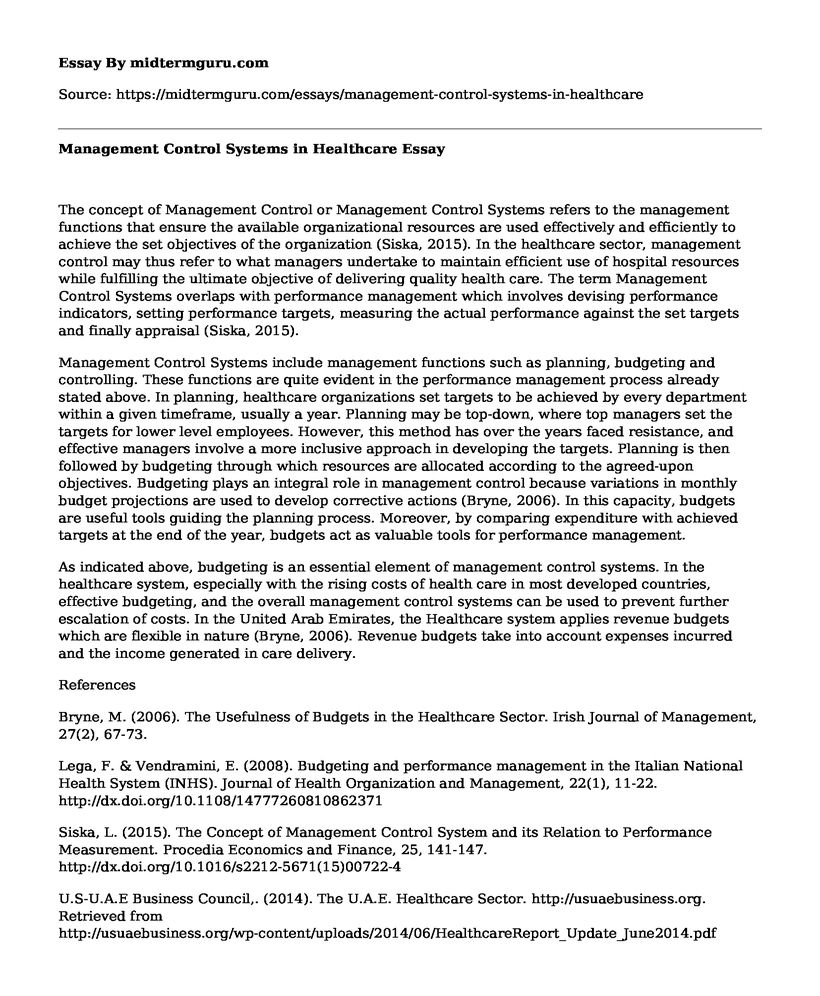The concept of Management Control or Management Control Systems refers to the management functions that ensure the available organizational resources are used effectively and efficiently to achieve the set objectives of the organization (Siska, 2015). In the healthcare sector, management control may thus refer to what managers undertake to maintain efficient use of hospital resources while fulfilling the ultimate objective of delivering quality health care. The term Management Control Systems overlaps with performance management which involves devising performance indicators, setting performance targets, measuring the actual performance against the set targets and finally appraisal (Siska, 2015).
Management Control Systems include management functions such as planning, budgeting and controlling. These functions are quite evident in the performance management process already stated above. In planning, healthcare organizations set targets to be achieved by every department within a given timeframe, usually a year. Planning may be top-down, where top managers set the targets for lower level employees. However, this method has over the years faced resistance, and effective managers involve a more inclusive approach in developing the targets. Planning is then followed by budgeting through which resources are allocated according to the agreed-upon objectives. Budgeting plays an integral role in management control because variations in monthly budget projections are used to develop corrective actions (Bryne, 2006). In this capacity, budgets are useful tools guiding the planning process. Moreover, by comparing expenditure with achieved targets at the end of the year, budgets act as valuable tools for performance management.
As indicated above, budgeting is an essential element of management control systems. In the healthcare system, especially with the rising costs of health care in most developed countries, effective budgeting, and the overall management control systems can be used to prevent further escalation of costs. In the United Arab Emirates, the Healthcare system applies revenue budgets which are flexible in nature (Bryne, 2006). Revenue budgets take into account expenses incurred and the income generated in care delivery.
References
Bryne, M. (2006). The Usefulness of Budgets in the Healthcare Sector. Irish Journal of Management, 27(2), 67-73.
Lega, F. & Vendramini, E. (2008). Budgeting and performance management in the Italian National Health System (INHS). Journal of Health Organization and Management, 22(1), 11-22. http://dx.doi.org/10.1108/14777260810862371
Siska, L. (2015). The Concept of Management Control System and its Relation to Performance Measurement. Procedia Economics and Finance, 25, 141-147. http://dx.doi.org/10.1016/s2212-5671(15)00722-4
U.S-U.A.E Business Council,. (2014). The U.A.E. Healthcare Sector. http://usuaebusiness.org. Retrieved from http://usuaebusiness.org/wp-content/uploads/2014/06/HealthcareReport_Update_June2014.pdf
Cite this page
Management Control Systems in Healthcare. (2021, May 26). Retrieved from https://midtermguru.com/essays/management-control-systems-in-healthcare
If you are the original author of this essay and no longer wish to have it published on the midtermguru.com website, please click below to request its removal:
- Servant Leadership in Nursing Team
- Ford and Taylorism Theories of Productivity - Paper Example
- Guide to the Occupational Safety and Health Act - Paper Example
- Elements of Good Governance - Paper Example
- Essay Example on Process of Bringing a Product or Service to Market
- Paper Example on HSBC Holdings Strategic Plan
- Marine Incidents in Polar Region: Human Performance and Risk Management - Essay Sample







